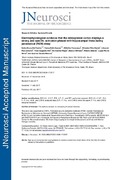Use este identificador para citar ou linkar para este item:
https://repositorio.ufrn.br/handle/123456789/23676| Título: | Electrophysiological evidence that the retrosplenial cortex displays a strong and specific activation phased with hippocampal theta during paradoxical (REM) sleep |
| Autor(es): | Koike, Bruna Del Vechio Farias, Kelly Soares Billwiller, Francesca Almeida-Filho, Daniel Libourel, Paul-Antoine Tiran-Cappello, Alix Parmentier, Régis Blanco, Wilfredo Ribeiro, Sidarta Tollendal Gomes Luppi, Pierre-Herve Queiroz, Claudio Marcos Teixeira de |
| Palavras-chave: | paradoxical sleep;electrophysiology;hippocampal theta;spatial memories;dreams |
| Data do documento: | 20-Jul-2017 |
| Resumo: | It is widely accepted that cortical neurons are similarly more activated during waking and paradoxical sleep (PS, aka REM) than during slow wave sleep (SWS). However, we recently reported using Fos labeling that only a few limbic cortical structures including the retrosplenial (RSC) and anterior cingulate (ACA) cortices contain a large number of neurons activated during PS hypersomnia. Our aim in the present study was to record local field potentials (LFPs) and unit activity from these two structures across all vigilance states in freely moving male rats to determine whether the RSC and the ACA are electrophysiologically specifically active during basal PS episodes. We found that theta power was significantly higher during PS than during active waking (aWK) similarly in the RSC and hippocampus (HPC) but not in ACA. Phase-amplitude coupling between HPC theta and gamma oscillations strongly and specifically increased in RSC during PS compared with aWK. It did not occur in ACA. Further, 68% and 43% of the units recorded in the RSC and ACA were significantly more active during PS than during aWK and SWS, respectively. In addition, neuronal discharge of RSC but not of ACA neurons increased just after the peak of hippocampal theta wave. Our results show for the first time that RSC neurons display enhanced spiking in synchrony with theta specifically during PS. We propose that activation of RSC neurons specifically during PS may play a role in the offline consolidation of spatial memories, and in the generation of vivid perceptual scenery during dreaming. |
| URI: | https://repositorio.ufrn.br/jspui/handle/123456789/23676 |
| Aparece nas coleções: | ICe - Artigos publicados em periódicos |
Arquivos associados a este item:
| Arquivo | Descrição | Tamanho | Formato | |
|---|---|---|---|---|
| ClaudioQueiroz_ICe_2017_Electrophysiological evidence.pdf | ClaudioQueiroz_ICe_2017_Electrophysiological evidence | 4,81 MB | Adobe PDF |  Visualizar/Abrir |
Os itens no repositório estão protegidos por copyright, com todos os direitos reservados, salvo quando é indicado o contrário.

